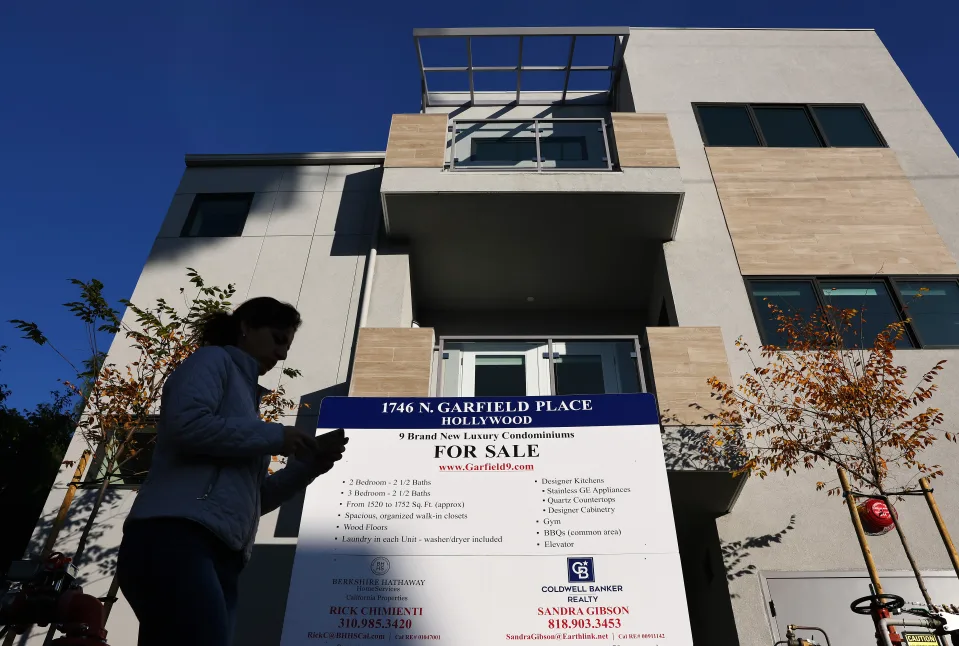Mortgage rates fell for the sixth straight week, hovering just above 7% and reigniting some life back into the refinance market.
The rate on the 30-year fixed mortgage decreased to 7.03% from 7.22% the week prior, Freddie Mac reported Thursday. That’s its lowest level since mid-August and down three-quarters of a point since the end of October.
While some would-be buyers still stuck to the sidelines despite the dip, homeowners looking for a chance to refinance were quick to move.
“When rates began to rapidly drop, purchase applications rebounded initially, but this improvement in demand diminished in the last week,” said Sam Khater, Freddie Mac’s chief economist, in a statement. “Although these lower rates remain a welcome relief, it is clear they will have to further drop to more consistently reinvigorate demand.”
‘A depressed housing market’
As rates dropped back in the last six weeks, some buyers came back to the market. But the latest dip in rates didn’t spur additional activity.
The volume of purchase applications fell 0.3% on a seasonally adjusted basis for the week ending Dec. 1, according to the Mortgage Bankers Association (MBA). Overall, purchase activity remained 17% lower than a year ago.
“The rate environment has created constraints in the industry, and it’s been a depressed housing market going on a year now,” Jeffrey Ruben, president of WSFS Mortgage, told Yahoo Finance. “We’re hanging in there, working off of depressed levels, but we’re not seeing a rebound anytime soon.”
The lull in activity is mostly due to the shortage of inventory on the market, which have kept home prices elevated. It’s also driven buyers to take on more expensive monthly payments.
Since May 2022, a buyer of a typical for-sale home listed at the prevailing fixed-rate mortgage with a 20% down payment was giving up over a quarter or more of their typical household paycheck, Realtor.com found. By October, it required 39% of the typical household income to purchase a home – and that share is expected to average 36.7% for 2023. Typically, that figure has averaged 21%, Realtor.com added.
To ease some of that financial burden, some folks have turned to adjustable-rate mortgage loans (ARM), which often offer a lower starting rate compared to fixed-rate loans.
“We have a really attractive ARM rate that ranges about 75 to 100 basis points lower than the 30-year fixed,” Ruben said. “That seems to be an attractive alternative for some borrowers. Others have become frustrated with the existing homes market and have moved on to new construction.”
Read more: What is an adjustable rate mortgage? Is an ARM the way to go in 2023?
New builds have also been a silver lining for buyers looking for the opportunity to negotiate price reductions, snag a lower rate through mortgage rate buydowns, or get other attractive incentives such as down payment assistance.
Still, even that side of the market has shown signs of strain under the pressure of higher rates. Sales of newly built homes continued to slide in October – though some experts expect some recovery by the year-end as rates ease.
“Buyers have acknowledged that they’re in a higher-rate environment. They’ve digested that concept already,” Ruben said. “The inventory is so thin and difficult that they say, ‘we might as well take the next step up, make that lateral move or build something.’ But the timing, the costs… is really the big thing.”
‘People are dating the rate’
While buyers are still mulling over their purchase plans, some homeowners jumped on the opportunity to snatch a lower rate.
The refinance index increased 14% from the previous week, the MBA survey of applications for the week ending Dec. 1 found, and was 10% higher than the same week one year ago.
“Refinance applications saw their strongest week in two months, increasing on a year-over-year basis for the second consecutive week for the first time since late 2021,” Joel Kan, MBA’s deputy chief economist, said in a press statement. “The overall level of refinance applications is still very low, but recent increases could signal that 2023 was the low point for this cycle for refinance activity.”
A dip in rates may be just what some new homeowners — who are shouldering a fixed-rate above 8% or agreed to an adjustable-rate mortgage — are aiming for.
“People are only dating the rate, meaning they can get something like an adjusted full loan in hopes of down the road, refinance that into a fixed lower rate,” Ruben said. “Those that were able to get a home are happy, while the ones out there still hunting are becoming frustrated.”

